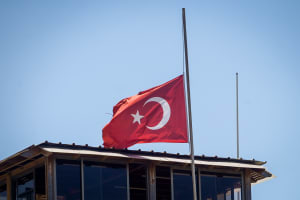Iran seeking ‘balanced agreement, not surrender’ as second round of nuclear talks ends
Next round set for next weekend in Oman following week of technical talks

The second round of talks between the United States and Iran over the regime’s nuclear program concluded after approximately four hours on Saturday in Rome, Italy.
Before the talks began, Ali Shamkhani, a senior advisor to Iran's supreme leader, stated on 𝕏 that Iran was seeking a “balanced agreement, not surrender.”
The Sultanate of Oman, which functions as a mediator between the sides, stated after the meeting, “This phase aims to reach a permanent and binding agreement that guarantees Iran’s full renunciation of nuclear weapons, the complete lifting of sanctions and the safeguarding of its right to develop nuclear energy for peaceful purposes.”
The U.S. side, represented by White House envoy Steve Witkoff, did not immediately issue a statement on the content of the talks. However, the scheduling of another round for the following weekend – along with statements from the Iranian delegation – suggests that the discussions advanced sufficiently to warrant continued negotiations.
Speaking to state media, Iran’s representative and Foreign Minister Abbas Araghchi said, “There is no reason for much optimism, and there is no reason for much pessimism either".
“The talks were held in a constructive environment and I can say that [they] are moving forward,” Araghchi added. “I hope that we will be in a better position after the technical talks.”
According to Araghchi, teams from both nations will meet throughout the week to prepare for next Saturday’s session, which is expected to take place once again in Oman.
Despite U.S. President Donald Trump's assertion that the talks would be held directly, media reports indicated that during the negotiations, the teams remained in different rooms, with the Omani foreign minister acting as a go-between, shuttling messages back and forth.
Oman’s Foreign Ministry confirmed that talks would continue in the capital, Muscat.
One of the most critical issues under discussion is whether Iran will fully dismantle its nuclear capabilities – especially its uranium enrichment activities, which could potentially be used to produce nuclear weapons.
According to Reuters, a senior Iranian official said that dismantling the uranium enrichment centrifuges or reducing its stockpile of enriched uranium below levels agreed in the 2015 deal would be a red line.
In his statement, Ali Shamkhani said Iran’s negotiators have “full authority” to negotiate a deal based on “seriousness and balance,” provided it includes guarantees that the U.S. will not be able to unilaterally withdraw from the agreement again, as President Trump did during his first term in 2018.
Such a deal must also include the removal of existing sanctions on Iran, Shamkhani said, stressing that the regime would not accept a Libya-style full dismantling of its nuclear infrastructure, as demanded by Israeli Prime Minister Benjamin Netanyahu.
An agreement would also need to include “guarantees, balance, no threats, speed, lifting sanctions…containing troublemakers (like Israel), and promoting investment,” he added.

The All Israel News Staff is a team of journalists in Israel.
You might also like to read this:
















